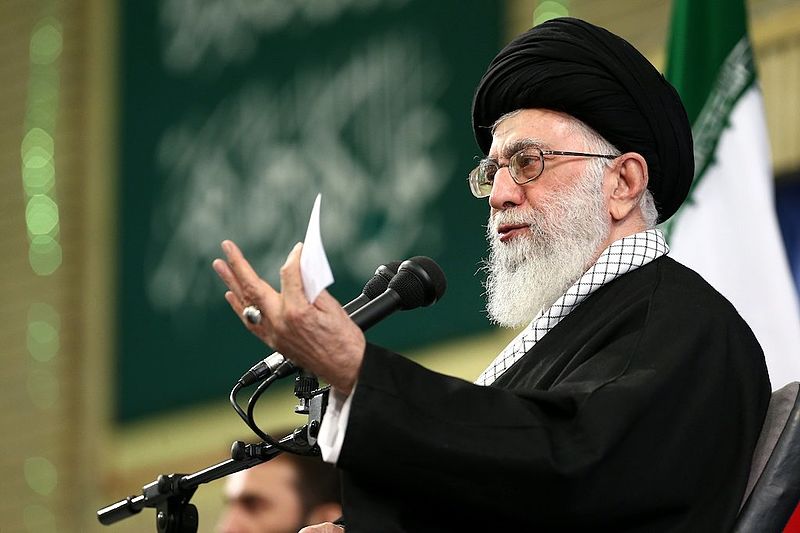 Ali Chamenei przemawiający do oficerów irańskiego lotnictwa. (Wikipedia)
Ali Chamenei przemawiający do oficerów irańskiego lotnictwa. (Wikipedia)
 Możliwość „złotego wieku” na Bliskim Wschodzie
Możliwość „złotego wieku” na Bliskim Wschodzie
Majid Rafizadeh
Tłumaczenie: Małgorzata Koraszewska
Nigdy nie lekceważ potęgi jednej kadencji administracji ani szkód, jakie polityka – czy to konstruktywna, czy źle poinformowana – może wyrządzić na arenie międzynarodowej.
W miarę jak administracja prezydenta Joe Bidena zbliża się do końca swojej kadencji, trudno nie zauważyć globalnej niestabilności, ośmielonych przeciwników i rozbitych sojuszy.
To są lekcje o kosztach słabego przywództwa i konsekwencjach strategicznych błędów w polityce zagranicznej.
Przez ostatnie cztery lata autorytarni przywódcy na całym świecie wykorzystywali okazje, jakie im dawało to, co uważali za słabość amerykańskiego przywództwa. Dyktatorzy, którzy wcześniej byli izolowani lub ograniczani, najwyraźniej dostrzegli okazję i wykorzystali tę strategiczną próżnię. Rosja dokonała inwazji na Ukrainę. Chiny puszczały balony szpiegowskie nad najbardziej wrażliwymi amerykańskimi instalacjami nuklearnymi, a także zabijały co najmniej 100 tysięcy Amerykanów rocznie fentanylem i innymi opiatami.
Iran, niegdyś na skraju załamania gospodarczego i pogrążony w niepokojach wewnętrznych, ożywił się i wzmocnił, gdy polityka USA pozwoliła na przepływ miliardów dolarów do jego gospodarki. Ten napływ zasobów i odczuwalny brak zdecydowanego sprzeciwu ze strony USA umożliwiły przywódcom Iranu bardziej agresywne zaznaczenie swojej obecności na arenie międzynarodowej. Bez wątpienia ośmieleni tą odnowioną siłą, Korpus Strażników Rewolucji Islamskiej (IRGC) Iranu i terroryści – Hamas, Hezbollah, Palestyński Islamski Dżihad i Huti, między innymi – rozpoczęli bezczelne ataki na Izrael i skutecznie zablokowali żeglugę przez Kanał Sueski. Po raz pierwszy Iran wystrzelił z własnego terytorium setki pocisków balistycznych, pocisków manewrujących i dronów szturmowych na Izrael, kraj mniejszy niż stan New Jersey – demonstracja fundamentalistycznego zaangażowania reżimu w zniszczenie państwa żydowskiego.
Co ważniejsze, widząc osłabienie pozycji USA, reżim irański przyspieszył prace nad bronią jądrową, posuwając swój program tak dalece, że są o „1-2 tygodni” od możliwości konstrukcji bomb nuklearnych. Irańscy przywódcy twierdzą teraz otwarcie, że osiągnęli poziom technologiczny wymagany do zbudowania broni jądrowej. Teheran spieszył się coraz bardziej, aby osiągnąć ten długofalowy cel. Zdobycie przez Iran broni jądrowej jest osiągnięciem, które nie tylko zdestabilizuje Bliski Wschód, ale niewątpliwie pobudzi „największy ze wszystkich wyścig zbrojeń”.
Prezydent-elekt Donald J. Trump wydaje się obecnie niechętny zmianie reżimu w Iranie. Jednakże – ze względu na zobowiązanie reżimu do „wymazania Izraela z mapy” i, jak stanowi irańska konstytucja, do eksportowania swojej wersji islamu na cały świat – nie wydaje się, aby istniała możliwość prawdziwego, długoterminowego pokoju na Bliskim Wschodzie bez zmiany reżimu. Cokolwiek innego niż to jest po prostu zachętą dla reżimu do przeczekania Trumpa, a także jego następcy.
Rosja, nie zadowalając się jedynie naruszeniem suwerenności Ukrainy, pielęgnowała również coraz silniejsze partnerstwo wojskowe z Chinami, Koreą Północną i Iranem. Iran przekształcił się w znaczącego dostawcę broni dla Moskwy i dostarczył kluczowe drony i pociski oraz inną broń niezbędną do kontynuowania przez Rosję agresji militarnej w Ukrainie.
Niedawno Korea Północna wysłała do Rosji 10 tysięcy żołnierzy. „Dlaczego Putin to robi? – zapytał senator USA Rick Scott. – Ponieważ wie, że Biden jest słaby”.
Senator USA Lindsey Graham stwierdził, że Biden „zniszczył świat na wszystkie możliwe sposoby”. „Świat płonie” – powiedział Graham w programie „Meet the Press” stacji NBC.
Chiny i Korea Północna dołączyły do Iranu, wspierając cele Rosji, wprowadzając tym samym nową grupę, która rzuca wyzwanie wpływom Zachodu. Bezczynność administracji Bidena nie tylko umożliwiła, ale i przyspieszyła powstanie tej potężnej koalicji wśród najbardziej represyjnych reżimów świata – nowej „Osi Zła”: Chin, Rosji, Iranu i Korei Północnej.
Brak zdecydowanych reakcji administracji Bidena najwyraźniej stworzył lukę w przywództwie na arenie międzynarodowej – lukę, która została szybko wypełniona przez tę oś autorytarnych dyktatorów. „Tehran Times”, gazeta bliska irańskiemu ministerstwu spraw zagranicznych, otwarcie chwaliła się, że „dziś jesteśmy świadkami kształtowania się nowego porządku świata” i przyznała, że próżnia ta pozwoliła im realizować swoje plany.
Iran również otwarcie łamał sankcje, sprzedając broń Rosji i angażując się w handel ropą zarówno z Rosją, jak i Chinami. Eksport ropy z Iranu najwyraźniej osiągnął szczyt.
Nie ma wystarczająco mocnych słów do ostrzegania narodów przed niebezpieczeństwami, jakie mogą wynikać z braku silnego przywództwa, niebezpieczeństwami niedoceniania ambicji państw wrogich i paraliżem wynikającym z niemożności stawienia czoła przeciwnikowi ze strachu przed eskalacją. Przeciwnik, a nie przywódca Wolnego Świata, powinien obawiać się „eskalacji”.
Jedna kadencja Bidena przyczyniła się do bezprecedensowej destabilizacji globalnego bezpieczeństwa w Europie Wschodniej, na Bliskim Wschodzie i w regionie Indo-Pacyfiku. Jest to zamęt naznaczony niekontrolowanymi postępami nuklearnymi Iranu, wzmocnionymi reżimami autorytarnymi i ośmieloną osią narodów gotową rzucić wyzwanie interesom USA na całym świecie.
„Nigdy nie martwię się o działanie – powiedział kiedyś Winston Churchill – ale o bezczynność”.
Konsekwencje umożliwienia Iranowi, jego sojusznikom i sojusznikom (Rosji, Chinom, Korei Północnej i innym wrogim graczom) działania bez znaczącego odstraszania po prostu podkreśla potrzebę „złotej ery” – zwłaszcza nowego reżimu w Iranie, który będzie bardziej odpowiadał marzeniom tak wielu obywateli Iranu – i ani o chwilę nie jest na to za wcześnie.
Majid Rafizadeh – Amerykański politolog irańskiego pochodzenia. Wykładowca na Harvard University, Przewodniczący International American Council. Członek zarządu Harvard International Review.
Zawartość publikowanych artykułów i materiałów nie reprezentuje poglądów ani opinii Reunion’68,
ani też webmastera Blogu Reunion’68, chyba ze jest to wyraźnie zaznaczone.
Twoje uwagi, linki, własne artykuły lub wiadomości prześlij na adres:
webmaster@reunion68.com




